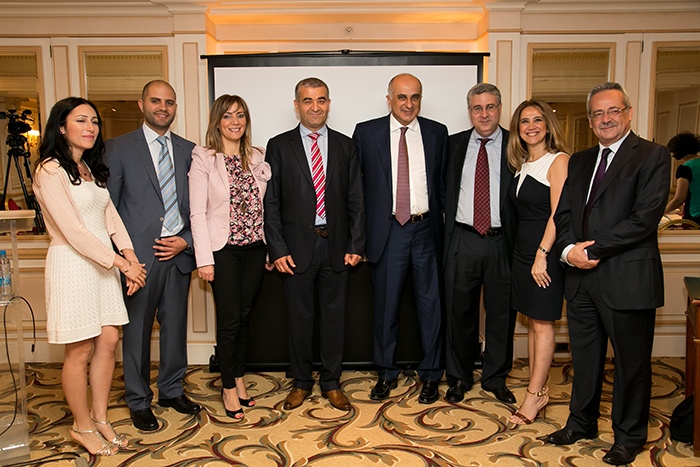New Test for Cancer Patients: Tumor Profiling
IPS Genomix organized a symposium on "New Test for Cancer Patients: Tumor Profiling" at Le Vendôme Hotel, Lebanon with members of the scientific press in attendance.
Speakers at the symposium were Fadlo Khuri, MD, Professor and Chair of the Department of Hematology and Medical Oncology at Emory University, and Deputy Director of the Winship Cancer Institute, USA; and Fadi Farhat, MD, Professor of Hematology and Oncology, and President of the Lebanese Society of Hematology and Oncology.
In the opening speech, the chief operating officer of IPS Genomix, Dr Rima Helou, presented IPS Genomix and its endeavor to provide cancer patients in Lebanon, the Middle East and Africa with the latest genetic testing services, through its cooperation with Caris Life Sciences and Nanostring —two of the most prominent US companies known for their leading work in the development of personalized medicine in oncology. Through its state-of-the-art tumor profiling test, IPS Genomix aims to provide patients with the most effective and appropriate treatment in fighting cancer.
The participants received with keen interest Professor Khuri's intervention in which he described the ongoing paradigm shift in the treatment of cancerous tumors. "In the past we used to follow specific protocols to treat each cancerous tumor, i.e. we used to apply a one-size-fits-all approach," said Professor Khuri. "If the treatment failed, we would be confused given the limited options that were available for treatment and would try to find the best protocol or treatment to follow. However in many cases, the selected medications proved ineffective in treating specific cancerous tumors, which would have negative effects on the patient's health due to the failure of the treatment, while increasing the level of toxicity in his body because of his exposure to needless medication. Additional costs would also be incurred by patients or the insurance companies." He added: "However today, with the development of genetics and available techniques, we are able to perform molecular tumor profiling and analyze the genetic information and specific proteins of each patient's cancer."
Professor Khuri highlighted the medical and economic benefits of the tumor profiling test: "This test has a huge medical benefit. When comparing the molecular 'fingerprint' of the patient's tumor with the published medical research, for example in the MI Profile Report, the physician can identify the agents/medications with potential benefit to fight the tumor. Thus it would be possible to avoid ineffective treatments, and spare the patient the exposure to doses of highly toxic drugs that might not achieve the desired outcome. The result is a more successful treatment with a lower cost."
Professor Fadi Farhat’s talk focused on the rising need for cancer patients today to be informed of their medical condition, and to work with their physician to choose the treatment most suited for their specific needs: "A study presented at ESMO 2012 showed that 89 percent of the patients surveyed wanted to be informed by their physicians about the kinds of treatments that suit them personally. Also, 74 percent are ready to wait before starting the treatment, until the most appropriate option is chosen on the basis of the results of the genetic test to determine the tumor profiling."
Professor Farhat emphasized the significant impact of the tumor profiling test on the quality of life of the patient and his/her family and community: "In breast cancer (stage I or II), the patient is confronted with a major concern: what happens after the surgery?... Would a hormone therapy be enough for her? Or would she need chemotherapy as well? At this stage, genetic tests such as Prosigna would help the physician decide on the most appropriate and effective management for his patient. A study published in the Journal of Clinical Oncology (Dowsett M. et al, JCO, 2013) showed that up to 60 percent of breast cancer patients (stage I or II) can be spared the exposure to chemotherapy and its side effects, thanks to this genetic test." He concluded: "We, as physicians, always look to obtain the best results from the treatment we choose, either through full recovery or by significantly reducing the risk of tumor recurrence for as long as possible. The aim is to see the patient happy and able to enjoy his life with his loved ones."

